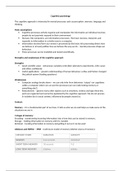Deeltoets 1
Baumeister & Bushman: H1 t/m 6
Noba module: Sensation and perception
Noba module: Multi-modal perception
Noba module: Attention
Noba module: Thinking like a psychological scientist
Brysbaert H4
,H1 The Mission & the Method
Social psychology: the scientific study of how people affect and are affected by others.
The competition machine created by Triplett to test whether the presence of others affects
individual performance. He found that children wound the fishing reel faster in the presence of other
children than when they were alone.
A brief history of social psychology
Behaviorism: theoretical approach that seeks to explain behavior in terms of learning principles
such as reward and punishment, without reference to inner states, thoughts, or feelings.
Behavioral psychologist conducted countless studies using white rats.
Freudian psychoanalysis: theoretical approach that seeks to explain behavior by looking at the
deep unconscious forces inside the person. Preferred elaborate interpretations of individual
experiences instead of experimental studies that counted behaviors.
What do social psychologists do?
ABC triad: Affect (how people feel inside), Behavior (what people do), Cognition (what people think
about). These are the three dimensions or building blocks of social psychology.
Social psychology’s place in the social sciences
Social scientists are interested in how people relate to one another. The various social sciences focus
on different aspects of social life.
Anthropology: the study of human culture – the shared values, beliefs, and practices of a group
of people, which are passed down from one generation to another.
Economics: the study of the production, distribution, and consumption of goods and services,
and the study of money.
History: the study of past events. For humans to progress, they should understand past events
and learn from them.
Political science: the study of political organizations and institutions, especially governments.
Sociology: the study of human societies and the groups that form those societies. Although both
sociologists and social psychologists are interested in how people behave in societies and groups,
they differ in what they focus on. Psychologists tend to tart from inside the individual and work
outward, whereas sociologists start with large units such as countries, religions, and
organizations, and work from there.
Social psychology’s place within psychology
Psychology: the study of human behavior. Social psychology is just one of the branches.
Biological psychology (physiological psychology, neuroscience): the study of what happens in
the brain, nervous system, and other aspects of the body.
Clinical psychology: branch of psychology that focuses on behavior disorders and other forms of
mental illness, and how to treat them.
Cognitive psychology: the study of thought processes, such as how memory works and what
people notice.
Developmental psychology: the study of how people change across their lives, from conception
and birth to old age and death.
Personality psychology: the branch of psychology that focuses on important differences
between individuals.
Social psychology: focuses on how human beings think, act, and feel. Thoughts, actions, and
feelings are a joint function of personal and situational influences.
, Why people study social psychology
Curiosity about people
Experimental philosophy
o Philosophy: “love of wisdom”; the pursuit of knowledge about fundamental matters as life,
death, meaning, reality, and truth.
Making the world better
o Applied research: research that focuses on solving particular practical problems.
o Basic research: research that focuses on a general understanding of basic principles that van
be applied to many different problems.
Social psychology is fun
How do social psychologists answer their own questions?
Accumulated common wisdom
Overview of the scientific method
o Hypothesis: an idea about the possible nature of reality; a prediction tested in an
experiment.
o Within-subjects design: participants are exposed to all levels of the independent variable.
o Between-subjects design: participants are exposed to only level of the independent variable.
Scientific theories
o Theories: unobservable constructs that are linked together in some logical way.
o Independent variable: the variable manipulated by the researcher that is assumed to lead to
changes in the dependent variable.
o Dependent variable: the variable in a study that represents the result of the events and
processes.
o Operational definitions: observable operations, procedures, and measurements that are
based on the independent and dependent variables.
o Confederate: a research assistant pretending to be another participant in a study.
o Construct validity of the cause: extent to which the independent variable is a valid
representation of the theoretical stimulus.
o Construct validity of the effect: extent to which the dependent variable is a valid
representation of the theoretical response.
Research design
1. Experiment: a study in which the researcher manipulates an independent variable and
randomly assign people to groups (levels of the independent variable).
o Random assignment: procedure whereby each study participant has an equal chance of
being in each treatment group.
o Institutional Review Board (IRB): is a committee that makes sure that a research study
conducted in university settings is ethical. The board must contain at least one scientist,
one nonscientist, and one person not affiliated with the university.
o Consent form: a document that participants receive before a study begins; the form
contains enough information about the study procedures, including any potential harm
they might experience, so participants can decide if they want to participate.
o Demand characteristics: any clues in a study that suggest to participants what the
researcher’s hypothesis is.
o Deception studies: research studies that withhold information from participants or
intentionally mislead them about the purpose of the study.
o Debriefing: an oral of written statement participants receive at the end of a
psychological study; it serves two main purposes: (1) to fully inform participants about
the study and answer any questions they have, and (2) to reduce or eliminate any stress
or harm the participant experienced by being in the study.







